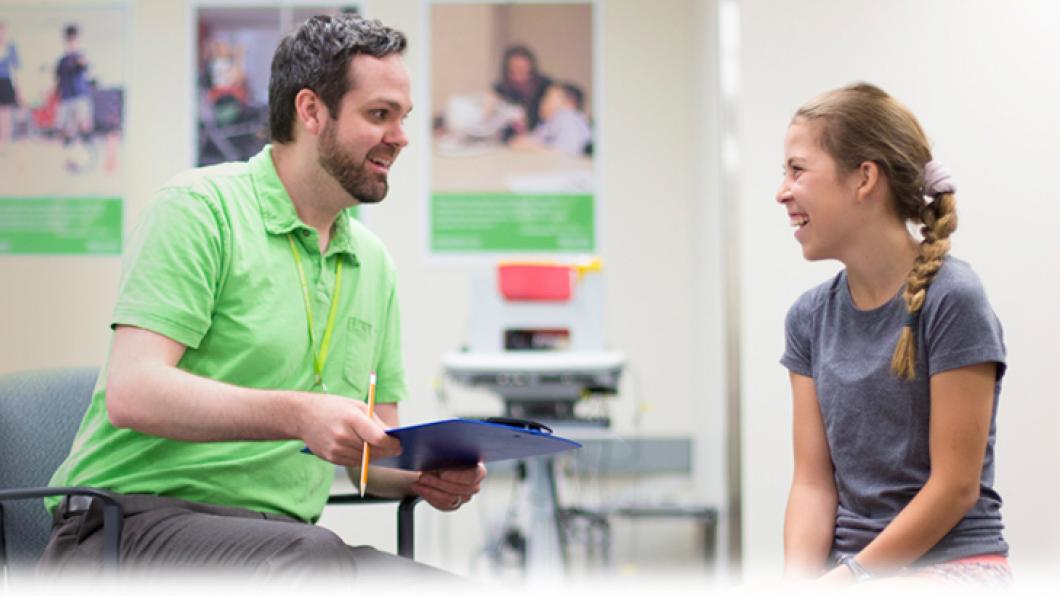
New concussion program eases pain for both kids and parents
After a concussion, children and youth need medical attention and rehabilitation care from health care professionals – that’s a no-brainer.
But to maintain a high standard of care, we need to train health care students on concussion.
The Concussion Centre at Holland Bloorview Kids Rehabilitation Hospital is making this happen and supporting kids and families along the way.
The On TRACK Health Professional Student Training Program is an exciting new approach to training the next generation of pediatric concussion experts.
On TRACK stands for Teaching, Research, Assessment, Care and Knowledge, and it gives health care students the chance to learn about pediatric concussion management.
As part of the new On TRACK Health Professional Student Training Program up to 50 professional health care students from fields like occupational therapy, physical therapy and social work are invited to take part each year.
Every student has three roles: give free ‘Concussion & You’ family education sessions at the hospital to teach families about concussion, including recovery strategies; support community outreach and advocacy programs; and help plan and conduct research studies that focus pediatric concussion.
“When someone has a concussion, it can be difficult to access good information and direction in a timely manner.” said Dr. Nick Reed, Co-Director of the Concussion Centre. “At the same time, not a lot of health care professionals are trained to know how to deal with pediatric concussion."
“This innovative program not only provides an incredible training environment for the next generation of health care providers, but it also ensures children and parents get timely access to important information that they can use to help with recovery.”
Busy student bodies
The health professional students host ‘Concussion & You’ family education and support sessions twice a day on Tuesdays, Wednesdays and Thursdays. They are open to all families and no appointments or referrals are needed.
“Families can call us in the morning and come in the afternoon,” said Dr. Reed. “They get education, they get support, they get to talk to other families, and they get a plan for what to do next. We can get families something meaningful immediately.”
In the first 4 months of this program, over 100 youth and family members have taken part and felt empowered (as well as relieved) with helpful information and guidance.
“It’s magical,” said Dr. Reed. “You can really see the appreciation of the families, not only to get the information, but to have someone provide that level of support and give them the direction they need on what happens next.”
The health professional students also appreciate the opportunity to learn, and to share what they know.
In addition to the seminars and the opportunity to learn about and be a part of pediatric concussion research, the students are also out in the communities Mondays and Fridays, spreading the word about pediatric concussion. They’re delivering presentations to schools, sports leagues and community centres.
Turning frowns upside down
“For me, the best part is working with families,” said Melissa Hansen, a 2nd year Masters of Occupational Therapy student from the University of Toronto.
“They come with worry written all over their faces,” she added. “It’s incredibly rewarding to see these families walking away smiling and feeling confident because they have a concussion management plan for their child.”
A full tank accelerates recovery
The ’Concussion & You’ family education and support sessions aim to help children and youth with a concussion “keep their tank full.”
When recovering from a concussion, your body and your brain need energy, explained Dr. Reed. But when you have a concussion your tank is half full because a lot of that energy is going to healing.
“That means you can’t do all the things you normally do, and if you do try to do them all, you’re going to hit empty and feel really run down and the symptoms are going to get worse,” he said.
“With our ‘Concussion You’ sessions we’re going to give you strategies that keep that tank full. We review sleep strategies, relaxation strategies, nutrition strategies, and return to activities strategies. We also give out resources that can help people guide their recovery.”
Evaluation and a model for others to use
Behind the scenes, Dr. Reed and his team are also evaluating On TRACK Health Professional Student Training program to assess impact on families as well as on students.
“We’re seeing great success early on, and by evaluating this program we’re hoping to package this model for children’s hospitals around the world to better train future health care professionals on how to best support kids and families after a concussion”
If you would like more information on the On TRACK Health Professional Student Training Program or ‘Concussion & You’ family education and support sessions email concussion@hollandbloorview.ca , or visit hollandbloorview.ca/concussion.
Join Trillium Automobile Dealers Association and donate to our Concussion Centre.